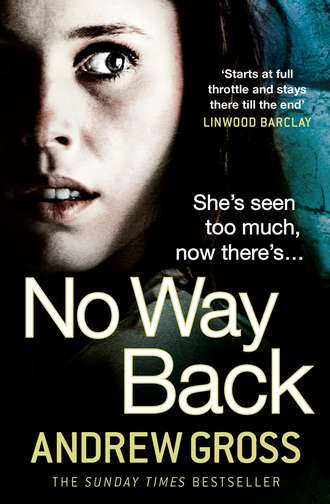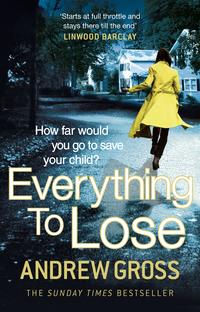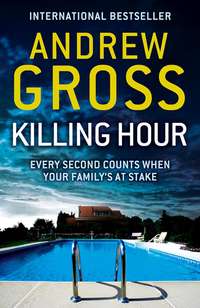
Полная версия
No Way Back
For her, what she owed was clear.
She had seen them. Through the maze of people. Before dragging Jamie and Taylor to the ground and burying her face in their trembling bodies. She had seen the shooter’s face and the dull, businesslike indifference in his eyes. The tattoo that ran down his neck. There was no attempt to hide it. The skeleton’s head that brought back all the terror and fear she had prayed she had forever left behind.
She knew who they were and where they were from.
And worse, Lauritzia thought, pressing the photo of her dead brothers and sisters to her pained heart, she knew exactly why they were here.
CHAPTER ELEVEN
Lauritzia knew she had to leave. Leave now. She could not put them in danger another time.
There was just nowhere in the world for her to go.
Only back home, she realized, though that would be a fate of certain death for her. The day she left, she knew she could never return. She no longer had a home. Except here, while it had lasted. The Bachmans had given so much to her. She would miss Taylor and Jamie as if they were her own. But she could not put them at risk. She had lived two years in the fantasy that she had somehow escaped her fate. Part of a new family. Going to school. Pretending there was an outcome for her except that which she knew would ultimately find her.
Maybe that was someone else’s dream. Like the one of her own store. And surrounding herself with happy things. She perfectly understood this, as she took her bags from the closet.
La cuota.
It had found her. And it would have to be paid.
Two mornings later she made breakfast for the kids, as she did most every weekday. She had waited for them to feel fit and ready to go back to school. Mrs. B had met with the principal the day before and decided it was okay for them to return. The two were strangely quiet and withdrawn on their ride there, as if they somehow suspected something. Maybe they were just nervous to face the many questions about what had happened and have to recount their frightening tale. Maybe it was something deeper—the violence always did that to children. Why would they understand? As she drove up to the school and they were about to run out, Lauritzia reached over and held them.
“Wait a minute,” she said. “I want a hug. An extra-special hug this morning. For friends forever.”
They looked at her as if it seemed a bit peculiar.
“I think I’ve earned it,” Lauritzia said, flashing them her happiest smile, trying not to show her sadness, which was killing her inside.
“Okay,” Jamie mumbled, and tilted his head against her arm. Taylor gave her a real hug, which Lauritzia put her whole soul into in return.
“I’ll see you soon,” she called after them. Then quietly to herself: “Quizá un día.”
Perhaps one day.
Back at the house, she hastily packed her belongings into her bags. Her clothes, many of them the fine things Mrs. B had given her. The pictures she had kept of her family. And ones with her new family too. A wooden carving of Santa Bessette that her sister Maria had given her, which now meant more to her than anything in the world. Sadly, Lauritzia put her textbooks aside on the night table.
She would not need them anymore.
When she was done, she dragged her bags out to the foyer and called for a taxi. Roxanne was at exercise class, and that gave her about half an hour. She sat at the kitchen island and tried to put her thoughts down in a note. To all of them. She told them how much she loved them all and how they were like family to her now, her only family, and always would be. But that she had to go back home.
“Lives here are not like where I come from” was all she said. The words were hard to get out. “There, they are not fully your own. I wish you all the love of God. You will always be in my heart. Each of you. Every day. You treated me with love and made me part of your life and for that it is I who can never repay you enough, not you me.”
She felt herself starting to cry.
Mercifully, she was saved by the sound of the cab honking outside. She brought her bags to the step and asked the driver to wait. Just a few moments more. She ran upstairs one last time, to the kids’ rooms, and placed a flower from the kitchen on each of their beds.
Where she was from it meant someone would always watch over you, no matter where in life you went.
As she finally went out the front door, carrying her bags to the taxi, she took a final look at the house that had given her a home for a second time.
Then she went down the stairs, wishing someone had put a flower on her pillow too.
CHAPTER TWELVE
Roxanne parked the Range Rover SUV in front of the three-car garage and went in through the kitchen. The bar method had been a real killer today. Jan was the instructor, and she always made her do things she didn’t think she could. Things no body was meant to do!
She had a crazy day ahead of her. There was the spring fund-raising lunch for the kids’ school, then a 2:00 P.M. meeting with a prospective new landscaper for the home owners’ association where they lived. She had a session planned with a trauma psychologist for the kids, so she had to pick them up herself; Harold said he would join. She had just put in a call to the school to check on how they were doing, and the principal said, while it was still early, so far everything seemed fine.
They’d been through hell, and Roxanne didn’t want to rush getting them back to normal.
“Lauritzia!” Roxanne called out as she came in, opening the fridge and grabbing a coconut water container. She took out her vitamins, magnesium pills, and fish oil. “Lauritzia, are you here?”
No answer. Maybe she was at the store. She took her iPad and sat down at the counter, thinking about her day.
That’s when she saw the note.
“Mr. and Mrs. B …”
As soon as she read the first sentence, which took her by surprise, her heart began to crumble.
“This is so difficult for me to write … , ” the letter began. “I have to go back home.”
Back home. Roxanne was dumbstruck. She was certain Lauritzia didn’t have any family there anymore. She had never completely spelled out the details, but she always said there was nothing for her back home anymore.
“You and your kids, you have been like a true family to me … You spoke of this after the terrible thing we witnessed the other day. But it is I who can never repay you, not …”
“Oh, no, no, no, Lauritzia …” Roxanne felt herself almost start to cry.
She didn’t know what could have caused Lauritzia to panic so. Obviously it was connected to what had happened at the mall. That had triggered something. She and Harold had noticed that Lauritzia hadn’t seemed herself since. But to leave like this. Out of nowhere. Without even saying good-bye. And to go where? Back home … back to a place where she had nothing. Running away as if she was in fear. Running from what? The kids would be brokenhearted.
The note made it seem as if she felt she had no options. But she did. She did have options.
Roxanne ran into Lauritzia’s room. The bed had been made, her textbooks piled neatly on the night table. How proud she had been the day she came back with them! The closet was cleaned out. Roxanne checked the bathroom. Empty. She sat sadly on the bed.
Oh, God, Lauritzia. Why?
It was clear she could only have left just a few minutes earlier. She had driven the kids to school. And the Ford Escape, the car she always used, was still in the driveway, so she must’ve called a cab.
Roxanne punched in the number, already sure where Lauritzia would head. She glanced at her watch. She knew she only had minutes.
“Riverside Cab.”
“Hi, this is Mrs. Bachman, at 230 Brookside. I think our nanny just left in one of your cars?”
“Yes, Mrs. Bachman.” The dispatcher paused, checking. “She should be just arriving at the station now.”
“Can you raise the driver? Can you tell him to tell her to wait for me? Tell her not to get on that train. I’ll be right there!”
She ran back into the kitchen and pulled off the Metro-North schedule that was pinned to the bulletin board. It was 9:32. The next train to New York was 9:45. Thirteen minutes. That didn’t give her much time.
Grabbing her bag, Roxanne jumped back into the Ranger Rover and backed out of the driveway. It was ten minutes to the station. If she didn’t get there, Lauritzia might well be gone, out of their lives forever.
She couldn’t let that happen. Not without letting her know, whatever it was, whatever had suddenly scared her, that she did have options.
She drove on Riverside, heading toward the station, and punched in Lauritzia’s cell on the Bluetooth.
No answer. She wasn’t picking up. Roxanne wasn’t surprised. The voice mail came on. “This is Lauritzia …”
“Lauritzia, this is Roxanne. Hon, I know you’re at the station. I’m headed there right now. I read your note. I know you feel you have to go, but whatever it is, I want you to wait for me. Just to talk, before you go. Will you wait for me, please! I’m on my way.”
She drove a little crazily, barely stopping at the signs on Riverside Avenue and Lake, then wound around the traffic circle into the station.
She drove up to the southbound tracks, just as a city-bound train was pulling in. She threw the car into park and ran up onto the platform. She looked in both directions, saw about a dozen people moving toward the opening doors. She didn’t see Lauritzia anywhere. Where the hell was she? Could she possibly have made it there ahead of time and gotten on a delayed, earlier train?
She threw her arms in the air and blew out a breath in dismay.
Then she saw her. At the far end of the platform, lugging her bags, just as the train came to a stop.
“Lauritzia!”
The nanny turned. There was something anxious and unhappy in her reaction, being spotted. Whatever it was, it wasn’t joy.
Roxanne sprinted down the platform, begging the doors not to close. “Lauritzia, please!”
Passengers got on. A conductor stepped out. “Nine forty-five to Grand Central! In or out, ma’am,” he said to Lauritzia.
She steadied her suitcases. Roxanne could see the conflicting emotions in her eyes. Hesitating …
Roxanne stopped about ten feet away. She just stood there. “Lauritzia, please … there’ll be another train. Please!”
The girl was tough as nails and 100 percent determined, but standing there, unsure what to do, she had the appearance of a frightened child. She took a step back onto the platform.
The train doors closed.
“I don’t want you to go,” Roxanne said, the train pulling away beside them. “I don’t know what happened. I don’t know why you feel you have to leave. But whatever it is, Harold and I want you to stay. The kids want you to stay.”
“I can’t …” Lauritzia shook her head. “I have to go.”
“We can help. You’re like family to us. You’re not alone, Lauritzia. Whatever it is, we’ll be there for you.”
“You can’t help.” Lauritzia’s eyes flashed defiantly. “You may think you can, but you can’t. And I didn’t save their lives. I didn’t. It was I who put them at risk.”
“What are you talking about?” Roxanne asked her.
Lauritzia grabbed her bags. She attempted to move away. But then one fell out of her grasp. She stopped. They were the only ones left on the platform.
“Tell me what it is. The kids love you. They’ll be heartbroken. We’ll be heartbroken.”
“And I love you all too. Don’t you understand?” Lauritzia put her bags down. “It is precisely because of that that I have to go.”
Roxanne went up and grabbed her. She put her arms around her and hugged her, feeling the tremor of the girl’s conflicted emotions. Until Lauritzia’s resistance began to wane, and her cheek fell wearily onto Roxanne’s chest, and she began to weep, her words falling off her lips like tears, tears of hopelessness and futility. “It will only bring bullets and tragedy. Please, Mrs. B, let me go.”
“Why?” Roxanne looked into her eyes. “Why do you have to run?”
“Don’t you understand, I didn’t save your children at the mall. I am the one who put them at risk. Those bullets weren’t meant for those other people who were killed.” Her eyes filled with terror. “They were meant for me!”
CHAPTER THIRTEEN
An hour later they were back at the house. Harold had rushed home at Roxanne’s urging. He and Roxanne went into Lauritzia’s bedroom. Sitting on her bed, clutching one of Taylor’s bears, her eyes red from weeping, Lauritzia told them what had happened.
“I know I told you I was from the south of Mexico,” Lauritzia began, “but I’m not. I’m from a region called Sinaloa. A town called Navolato. It is a village under the control of the Juarte cartel. Their plaza, it is called. It means the territory they control. Juarte, you may have heard of the name?” she asked, looking at Harold.
He just looked back at her and shrugged.
“Where I come from it is famous. Famous for the wrong things. The man who runs it, Vicente Juarte, he is known as ‘El Oso.’ The Bear. El Oso’s cartel is one of the biggest in Mexico, and he took over for his father when he was killed by a rival group. Killing and not knowing who will be killed next are a way of life in my home. The victims, they pile up in the streets. Six, seven a day. It is part of everyone’s life there. Do you know what happened to Ernesto Ayala? Did your cousin not come home from work on time? A part of everyone’s family. My family …”
She put down the bear, and Roxanne saw the wall of resistance and buried emotions Lauritzia was trying to break through. It was clear she did not tell this story to anyone.
“Three years ago, my father became a material witness against one of Juarte’s enforcers, a very brutal man named Eduardo Cano. ‘El Pirate.’ Cano was part of a group that is known as Los Zetas, the Z’s … maybe you’ve heard of them? They were once a part of the Mexican armed forces—I think trained by your own country’s military to go up against the cartels. But money lures, especially in Mexico, and so they formed their own cartel killing and protecting the drug sellers, and El Pirate, he worked closely for Vicente Juarte’s cartel.”
“How was your father involved?” Roxanne asked, her leg curled on the edge of the bed. “You always said he was a cook.”
“He was.” Lauritzia nodded. “Maybe a long time ago. When I was young. Three years ago, El Pirate conducted a hit in the town of Culiacán, near where I am from. My father, who worked for him now, was charged with carrying it out. He had his own nephew, my cousin, who was just a boy, take charge of it, in which two American citizens, a husband and wife, were murdered in their car, and by accident—though there is no such thing as an accident in Sinaloa—three other Americans, college kids, who were caught in the crossfire. It was his big step up for my cousin Lupe. His first real charge. Maybe you heard of the case here. I think it was on the news for a while …”
“I remember,” Harold said, leaning forward on the chair at Lauritzia’s desk. “I think they were there on spring break. One of them was even from Greenwich. Wasn’t someone charged in the crime?”
“Sí.” Lauritzia nodded. “Cano. Cano was charged. Months later he was apprehended in the United States. But somehow the case against him was dropped. You tell me, how does that happen? An attack against your own citizens. He was simply deported and never put on trial. He went back to Mexico, where he still works as a killer for Vicente Juarte.
“The government convinced my father that they would protect him. And us, his family. But when the trial was dropped, they blamed it on his testimony and did not follow through. They did not grant us asylum. Clearly he could no longer go back home. But Cano took revenge against him for his betrayal. One by one, he killed his children and nieces and nephews.”
Roxanne felt a weight fall inside her as it grew clear exactly who Lauritzia meant. Her own brother and sisters. She looked anxiously to Harold.
“First, they killed my brother, Eustavio,” Lauritzia said, “who was just a postal clerk in my village. They came and took him away as he was on his way to work, and they found him in a ditch a day later with burns all over his body and his genitals cut off.”
“Oh, God …” Roxanne looked at her, a wave of sympathy rushing into her eyes.
“Then my older sister. She worked in a beauty salon. She was beautiful and she was engaged to be married. They weren’t satisfied just with her. They came in and killed everyone in the salon. Twelve people. Innocent people. People who just worked there. Customers. They found Nina’s body with sixty bullet holes in it. No one was ever charged with the murder. No one, though they came in in the middle of the day and shot off over two hundred rounds.”
“Lauritzia,” Roxanne said, reaching for her hand.
“Then they killed my sister Maria, who was living with my cousins in Juárez. She’d been raped and all cut up—”
“Lauritzia, you don’t have to go on,” Harold said, exhaling a grim breath.
“Yes, yes, I have to go on. You should hear. This is the life we lead. This is what it is like for us there. My brother and sisters and I tried to come with my father when he was granted asylum in the States. But by that time, the trial against Cano had fallen apart and your government no longer had a need to accommodate him, so we were all denied. They said we had not proven that a threat existed directly against us, only against my father. Now they are all dead. All of them. My father could not even come back home to bury them.”
“Oh, baby, I’m so sorry,” Roxanne said, and leaned forward to hug her. Lauritzia pulled back and shook her head.
“Do you think it stopped there? No, it did not. It still goes on. These men, they are more vicious than animals. Animals would never stoop to do such things. They even killed my cousin, the one who conducted their own hit, that started this. Lupe. He was just a boy, nineteen. Yes, he was on the wrong side of things, but in Mexico there are two sides to life: those who are victims, who are poor and scared and cannot afford even the smallest luxury in life; and the ones who say yes and get involved. Who see the others driving big cars and carrying wads of bills and carrying on with the women. Plata o plomo, as we say. Silver or lead. That is their choice. He chose silver. Doing what they tell you to do is just the way. Do you think he knew any better? He was just nineteen …
“Then just before I started to work for you, they found my sister Rosa …” Lauritzia’s eyes started to fill up with tears. “Mi gemela. My twin.”
Now she had to stop. Roxanne moved over and finally took hold of her hand, squeezing it tightly. But Lauritzia just shook her head and wiped her eyes with the back of her hand, saying, “You wanted to know why I have to leave? So you should hear. You remember I had her picture here by my bed.”
“I remember,” Roxanne said, tears building in her eyes now as well.
“She was older. Six minutes. We used to laugh. She always insisted how she was that much wiser than me, six minutes, and no matter how much older I became she would always have that over me. She met a man. They were married. She was living in Texas. Dallas. She had a job, as an administrator for an insurance company. And she was pregnant. Five months pregnant. With my little nephew. They found her in the elevator of her building. I won’t even tell you what they did …” Tears shone in her eyes, tears of anger now. “He would have been named Eustavio. After our older brother, who they …”
She stopped and turned to Roxanne, her dark eyes glistening with rage. “This is why I told you to let me go! Do I need to finish the story? Do you understand now? What happened at the mall? That the only reason I am alive and the others are dead is because the killer began shooting and a policeman happened to be there.
“Yes, I saw them!” Lauritzia said. She turned to face Harold. “Of course I saw them! Los Zetas. I saw the look of the devil on the killer’s face and the dead man’s tattoo on his neck, and when I dragged your children to the ground, I prayed, Please, God, whatever you have for me, do not take them too! I swore that I would leave, so that is why I must. That is what I meant, that bullets and tragedy, they will never let up. These men, they carry their vengeance to the grave. Now you see why I have to go. It is my fate. I cannot put you or your children at risk. You should not have come after me. I’ve already said my good-byes. I should have gotten on that train!”
CHAPTER FOURTEEN
Harold asked where Lauritzia’s father was now. She merely shrugged and said she didn’t know.
Only that he was in this country somewhere. But that even the U.S. government no longer knew for sure. “He grew afraid. Cano was trained in this country, by your own agents. Why did the trial against him just fall apart? Influence is something that can be bought on both sides of the border, is it not? My father thought it best for me not to know his whereabouts. In order to protect me. I haven’t spoken to him since my sister was killed. More than two years now. We both protect our whereabouts.”
He shot Roxanne a look that suggested maybe they could try to locate him.
“No. No!” Lauritzia shook her head, reading his intention. “Do you really think I’d be safer with him? I would only draw him to them. Which is what they want.”
Roxanne asked her where she was heading to when she stopped her at the station.
“I have a cousin. In New Mexico. On my mother’s side.” Lauritzia shrugged. “I was going to see if she would let me stay there for a while.”
“And if she wouldn’t?”
“If she wouldn’t, then I do not know what I would do. I am in violation of a court order to return home. I have no job, and without a job I can no longer remain. I would go home.”
“Home?” Roxanne looked at her in shock. “Home is a death sentence for you, Lauritzia.”
“My life is a death sentence, Mrs. Bachman, don’t you see? Tell me what other choice I have! Live on the streets here and beg? Sell myself?”
Roxanne reached out and clasped her hand. “That’s why you never allowed us to sponsor you for your green card, isn’t it? Because you were afraid?”
“Yes. I was in violation of a court order to leave the country. They would have found out who I am and sent me back. And even if they didn’t, look what happened to Cano. He is Zetas. He is very connected with the United States. He would have found out where I was. I am sorry that I never told you these things.” She took Roxanne’s hand in hers. “I never wanted to place my worries on you. I never wanted to put your family at risk. You must believe that. But now that you know, the children will be coming home soon. I should leave …” She started to get up.
“No,” Roxanne said.
“No, Missus, it is not right.” Lauritzia stood up, but her eyes welled with tears. “It will be very hard for me to see them again and have to—”
“No.” Roxanne held her back by the arm. “This isn’t just a place of work for you. This is your home. No one forces you to leave.”
Lauritzia smiled, a smile that was both pleased yet skeptical, and went to pick up her coat and scarf. “I’m sorry, but I do not have a home anymore.”
“Yes, you do.” Roxanne took Lauritzia in her arms, the girl attempting to pull herself away, to grab her coat, to break free, until she just surrendered, not knowing whether to resist or go, the torrent building in her eyes, until she just gave up and put her head on Roxanne’s shoulder and began to cry.









